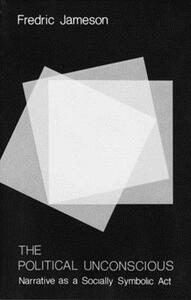Take a photo of a barcode or cover

Suicide as a Sort of Present
I don't run in these circles, so I wonder how Marxists on the street contemplated the (recent) death of the author (Jameson, in this case). This text seems meant as a gift to them. Here the author promises to decommission the Semiotic square, which, we hear, was once quite naughty in the way it functioned as non plus ultra of a closed literary analysis (albeit, one wonders whether these reports of misbehavior haven't been exaggerated. . .) To open up this square as if it were a kind of present seems to be the objective here.
The author spells it out in the case study of Conrad's Nostromo (1904): Construed as a bourgeois novel with the central problem of humanist self-development, the vertices of the Greimas square become The Ideal (S1), The Self (S2), Selflessness (-S2), and Cynicism (-S1). We don't like the paucity of this square and its determinate enclosure (resulting from (the author's) reading of this novel as a limited bourgeois project). The author's upbuilding solution here is to add to this figure (above) four additional vertices implied by the acknowledgement of the Political-Unconscious: i.e. Marriage (between Ideal and Selflessness), The Act (between Ideal and Self), History (Between Self and Cynicism (anti-Ideal)), and The Witness (between Selflessness and Cynicism).
The subsequent figure (below) appears to satisfy our Marxist-Freudian needs, though only 'til one looks it aslant (askance). It takes tilting the head tilted forty-five degrees to recognize this new figure is also one of those (notorious) geometrical Squares with the addition, intolerable even to Marxists, that now one's analysis must always move between the vertices of History (Marx) and Marriage (Freud). So we haven't made it out of the old box after all; our author appears to be re-gifting it in new wrapping paper. In our generosity we are prepared to forgive much from family and fellow travelers, though the gift of this text (i.e. the new-found ability to convict various literary works of unconscious Historical-Materialist impieties) is severe (for which we forgive it) and yet (unforgivably) not very funny. (Aside: this appears to be the persistent Differance between this author and Slavoj Žižek . . .)
So, to circle back, one wonders whether Marxists greeted Jameson's passing the same way feminists greeted the death of Beauvoir: The sense was, "well, now we can (finally) get to work." (Though, in this case, among much mourning, one wonders when (and if) the next wave of Marxism is coming . . .) It's notable that Jameson's life came to an end when the modern maxim of Biopower has become, "make live or let die." This is a recognition that, with the technological resources of an intensive care setting, there is no theoretical limit to the prolongation of a vegetative life on-vent. In such circumstances, we might count every death a suicide (in the good sense; a tactful withdrawal). David Foster Wallace would call this act of departing the scene at the right time, "Suicide as a sort of Present."

did not make for the best bedtime reading but worth it. for me, the most interesting takeaway was that the individual act of narration is ultimately a symbolic act unconsciously expressing a negotiation with dominant power structures. his other related ideas on reading class conflict and the historical dimension of modes of production in literature are important and well-articulated as well, just probably won’t have as profound of an impact on the way i read.
i feel like jameson’s hermeneutic approach is alrdy affecting how i approach fiction, and his ideas solidified my belief in narrative as not only a mouthpiece of the political unconscious but as perhaps the best (only) way to understand the interrelated layers of the personal and the social/historical!
i feel like jameson’s hermeneutic approach is alrdy affecting how i approach fiction, and his ideas solidified my belief in narrative as not only a mouthpiece of the political unconscious but as perhaps the best (only) way to understand the interrelated layers of the personal and the social/historical!
challenging
hopeful
informative
reflective
medium-paced
challenging
informative
reflective
slow-paced
Jameson’s writing is dense and he masters all the disciplines at the height of critical theory. This is a must read for any cultural critic.
challenging
informative
reflective
slow-paced
challenging
informative
slow-paced
challenging
informative
slow-paced
I like how he gives you permission to skip the first 50 pages because they're boring. But seriously this may be his finest work and it really screwed my head on straight.


